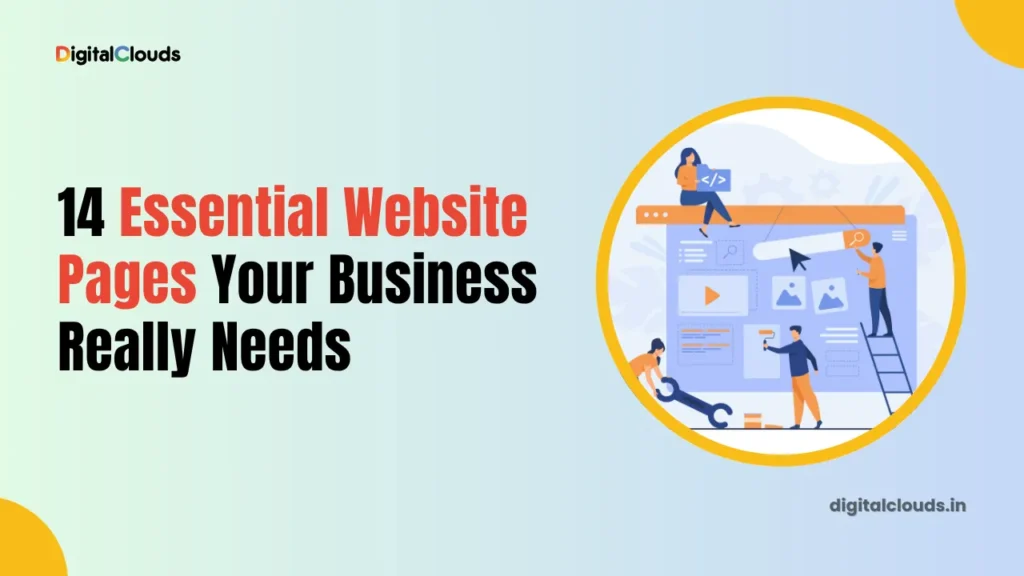14 Essential Website Pages Your Business Really Needs (Checklist)

Having the right Website Pages is like building a strong, welcoming house online. It shows visitors who you are, what you do, and why they can trust you. When done well, the right Website Pages strengthen your website development, boost SEO, build credibility, and help turn curious browsers into loyal customers.
In this guide, you will discover the 14 Essential Website Pages every business should have. These pages improve your website’s trust, support your SEO rankings, and give visitors the information they are looking for quickly and clearly.
What Are Essential Website Pages and Why Do They Matter?
Essential Website Pages are the must-have parts of your website. They give structure to your content and make your site easier to understand, for both people and search engines.
Here’s why they’re important:
- Improve user experience by helping visitors find what they need
- Boost SEO by adding clear, keyword-rich content
- Build credibility and trust with potential customers
- Guide visitors toward taking important actions like buying, calling, or signing up
Whether you run a local shop, an online store, or a service-based business, having the right Website Pages sets a strong foundation for online success.
How Many Website Pages Should You Have?
There’s no one-size-fits-all answer. It depends on your industry, goals, and audience.
- A small business website might need around 8–10 Pages.
- An e-commerce store may need hundreds (due to product listings).
- A service provider might start with a focused 10–15 pages.
Start small, with the Essential Website Pages, and add more as your business grows.
Quick Overview of Essential Website Pages
| Category | Pages |
| Must-Have | Homepage, About Page, Contact Page, Product Page, Service Page, Blog Page, Privacy Policy, Terms of Service |
| Highly Recommended | Testimonials/Reviews Page, FAQ Page, Sitemap, 404 Page, Returns/Refunds Page, Shipping Info Page |
| Optional | News/Updates, Careers Page, Search Results Page, Partner/Expert Page, Disclosure Page |
The 14 Essential Website Pages Your Business Needs

Let’s walk through each of the 14 Essential Website Pages and explain them in simple terms:
Homepage
Your homepage is the digital grand entrance and the foundation of your Website Pages. It’s typically the first impression people have of your business, so it must clearly represent your brand, provide direction, and guide users to other key pages within just a few seconds.
Best practices include:
- Clear headline and sub-headline: tell visitors right away what you offer and who you help.
- Value proposition: explain what problem you solve.
- Navigation links: to other Pages (products, services, about, blog).
- Calls to action: “Book Now,” “Shop,” or “Get Started.”
- Social proof: show customer testimonials or trusted logos.
- Visual hierarchy: use sections, bullets, and images that guide the eye and keep the page easy to scan.
Why it matters:
Users form an impression within 5 seconds—mix credibility and clarity to keep them exploring your site and other essential website pages.
About Page
The About Page is one of the most visited and impactful essential web Pages. It tells your origin story, highlights your mission, introduces your team, and gives your audience a human connection—key for building long-term trust and showing the people behind the business.
What to include:
- Founding story or personal journey
- Mission, vision, and core values
- Team bios with photos
- Milestones and achievements
- What makes your brand unique
Why it matters:
A compelling About Page builds trust and familiarity. People want to buy from businesses they understand and relate to. It’s one of the most emotionally powerful web Pages.
Contact Page
Your Contact Page is one of the most practical and necessary web Pages. It provides all the ways users can connect with your business—by phone, email, form, or even live chat—and reassures them you’re real, responsive, and ready to help.
What to include:
- Company address, phone number, and business hours
- Contact form with essential fields only
- Email address and support links
- Map embed and directions (if physical location)
- Social media links
Why it matters:
Without a clear Contact Page, you risk losing trust. Making it easy to reach you strengthens your brand’s reliability and improves customer satisfaction across your essential website pages.
Product Page
The Product Page is one of the most critical web Pages for online stores and e-commerce brands. It must educate, persuade, and convert visitors by combining compelling content, beautiful visuals, and straightforward options to purchase.
What to include:
- Product name, description, and features
- High-quality images or videos
- Price and variants (size, color, etc.)
- Customer reviews or ratings
- Availability, delivery options, and shipping info
- Call to action: “Buy Now” or “Add to Cart”
Why it matters:
Clear and complete Product Pages help customers make buying decisions with confidence. They reduce cart abandonment and improve conversion rates—key outcomes from your web Pages.
Service Page
The Service Page is another cornerstone of your essential website pages, especially for B2B businesses and professionals. It details the services you offer, who they’re for, and how they work, while guiding potential clients toward taking the next step.
What to include:
- Overview of each service offered
- Benefits and featuresare explained clearly
- Target audience—who it’s for
- Pricing structure or quote request
- Testimonials or case studies
- Strong call to action
Why it matters:
A well-organized Service Page reduces confusion, increases trust, and converts prospects into paying customers. It’s a foundational page among your web Pages.
Blog Page
Your Blog Page is the central hub of your content marketing efforts and one of the most powerful long-term SEO assets among all essential web Pages. It lets you demonstrate expertise, rank for keywords, and educate your audience on topics they care about.
What to include:
- Organized blog categories or tags
- Article previews with images
- Search functionality for blog content
- Regularly updated posts
- Calls to action in blog previews (like “Read more,” “Subscribe”)
Why it matters:
Fresh, helpful blog content attracts visitors through organic search and builds topical authority. It keeps your web Pages active and engaging for both users and Google.
Privacy Policy Page
The Privacy Policy Page is a legal requirement and one of the most important web Pages for businesses that collect user data. It outlines how you collect, use, store, and protect personal information, providing transparency that builds trust and compliance with global regulations like GDPR and CCPA.
What to include:
- What datado you collect (e.g., name, email, payment info)
- How do you use the data
- Third-party tools or integrations that access user data
- Cookie usage details
- Contact info for privacy-related questions
Why it matters:
A clear Privacy Policy improves user confidence and is essential for legal compliance. This essential Website Page is non-negotiable for any business operating online.
Terms of Service Page
The Terms of Service Page, also called Terms and Conditions or Terms of Use, is one of the Website Pages that sets expectations between you and your visitors. It defines what users can and cannot do on your website, helping protect your business legally and reduce liability.
What to include:
- User responsibilities and conduct
- Intellectual property notices
- Limitation of liability disclaimers
- Payment or subscription terms (if applicable)
- Governing law or jurisdiction clauses
Why it matters:
This page ensures users know the rules of using your site. Along with your Privacy Policy, it forms the legal backbone of your essential web Pages.
Testimonials or Reviews Page
The Testimonials or Reviews Page is one of the most persuasive web Pages because it leverages social proof. Instead of just promoting your services, it showcases real customer experiences, giving future customers confidence to choose your brand.
What to include:
- Written customer testimonials
- Star ratings or user-generated reviews
- Video testimonials (if available)
- Verified buyer badges or timestamps
- Links to external review platforms (e.g. Google, Yelp)
Why it matters:
Nothing builds credibility faster than genuine feedback. Testimonials convert skeptical visitors into buyers and strengthen your essential website pages by showing real-world value.
FAQ Page
The FAQ Page, short for Frequently Asked Questions, is one of the most functional and user-centric web Pages. It anticipates and answers common customer concerns, reducing support tickets, saving time, and improving user confidence in your business.
What to include:
- Questions about your services or products
- Honest and helpful answers
- Policies (shipping, return, billing)
- Technical or product-specific questions
- Searchable or collapsible (accordion) layout
Why it matters:
When done well, your FAQ Page handles objections before they become deal-breakers. It boosts user satisfaction and is a conversion-supporting asset in your collection of essential web Pages.
Sitemap Page
The Sitemap Page is a behind-the-scenes hero among essential website pages. It provides a structured list of all the pages on your website, making it easier for search engines to crawl your content and for users to find what they’re looking for.
What to include:
- Hierarchical links to all public-facing pages
- Blog post links organized by category
- Clear structure for major website sections
- Updated automatically or manually as needed
Why it matters:
An organized sitemap improves indexing and search visibility. It’s not just for bots—it helps humans too. This makes it a quiet but powerful essential Website Page.
404 (Page Not Found) Page
The 404 Page is one of the most overlooked essential website pages, but it can make a big impact when users land on broken or outdated links. A well-designed 404 page helps keep users on your site by guiding them back to useful content instead of letting them leave in frustration.
What to include:
- Friendly error message
- Link back to the homepage or key categories
- Optional search bar or site map
- Fun visuals or humor to reduce bounce
Why it matters:
Even when things go wrong, you can delight users and preserve brand trust. An effective 404 page turns a mistake into an opportunity within your essential website pages.
Returns/Refunds Page
The Returns/Refunds Page is a trust-building essential Website Page, especially for eCommerce and physical product businesses. It sets expectations before purchase and supports customers post-purchase, helping reduce complaints and increasing buyer confidence.
What to include:
- Return eligibility (time limits, conditions)
- Step-by-step return process
- Refund policy and timelines
- Contact method for support
- Links to related policies (shipping, FAQs)
Why it matters:
Shoppers often check this page before buying. A clear and fair return policy reduces risk in the buyer’s mind, making this one of the most conversion-friendly essential website pages.
Shipping Information Page
The Shipping Information Page is a must-have for product-based businesses and rounds out your essential website pages by informing buyers of delivery times, fees, and available regions, key for managing expectations and avoiding customer complaints.
What to include:
- Shipping methods and estimated delivery times
- Regions or countries you ship to
- Shipping costs and free shipping thresholds
- Tracking options and carriers used
- Delays or real-time service notices
Why it matters:
This page prevents misunderstandings and frustration. Setting clear expectations helps shoppers feel secure, an essential function of your website pages.
Bonus: Website Pages Checklist
To recap, here are all the essential website pages your business should include for maximum clarity, trust, and success online:
Must-Have Pages
- Homepage
- About Page
- Contact Page
- Product Page
- Service Page
- Blog
- Privacy Policy
- Terms of Service
Great-to-Have Pages
- Testimonials
- FAQ
- Sitemap
- 404 Page
- Returns/Refunds Page
- Shipping Information Page
Optional Pages
- Search Results Page
- News/Press Page
- Careers Page
- Partner/Experts Page
- Affiliate or Legal Disclosure Page
Build the Foundation With the Right Essential Website Pages
Your website is more than just a digital presence—it’s your brand’s first impression, your sales machine, and your trust builder. By starting with the 14 Essential Website Pages, you give your visitors exactly what they’re looking for: clarity, credibility, and a reason to stick around.
These Website Pages don’t just help your site look complete—they improve SEO, build trust, and guide users to take meaningful actions like contacting you, making a purchase, or subscribing to your services.
No matter your business type or industry, having these Essential Pages in place is key to online success.
🚀 Ready to Build a Website That Actually Works for Your Business?
Your website isn’t just a place online, it’s your 24/7 sales tool, your brand’s voice, and often the first impression customers get. Starting with the right Website Pages lays the groundwork for a high-performing, trustworthy, and user-friendly site.
But why stop at the basics?
💡 Let DigitalClouds help you create a powerful, custom-built website designed to grow your business.
Whether you’re starting fresh or looking to level up, our team of experts crafts beautiful, conversion-focused websites with all the right features—from core pages to advanced functionality.
👉 Ready to launch your site the right way?
📞 Contact DigitalClouds Today for quality website development that gets real results.
FAQs About Essential Website Pages
Have questions? Here are answers to the most common queries about building and optimizing your Essential Website Pages.





